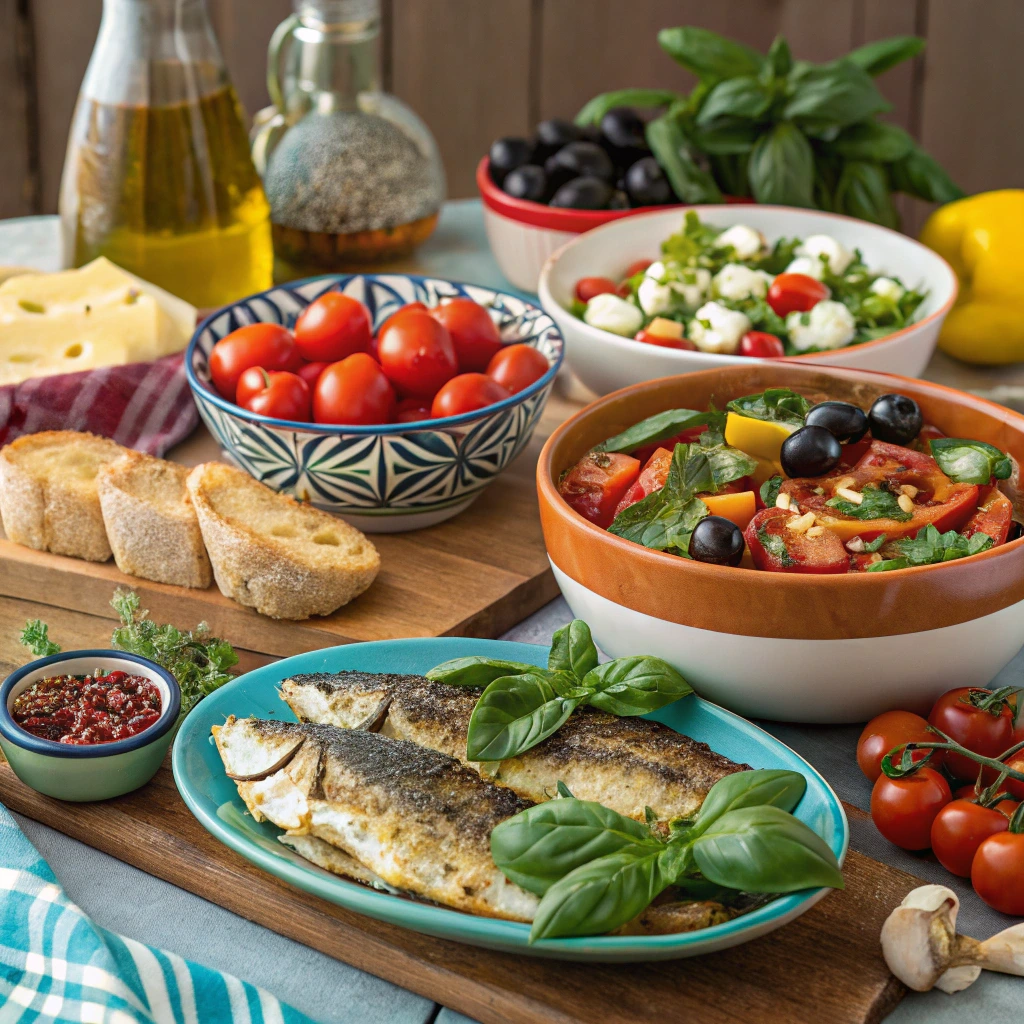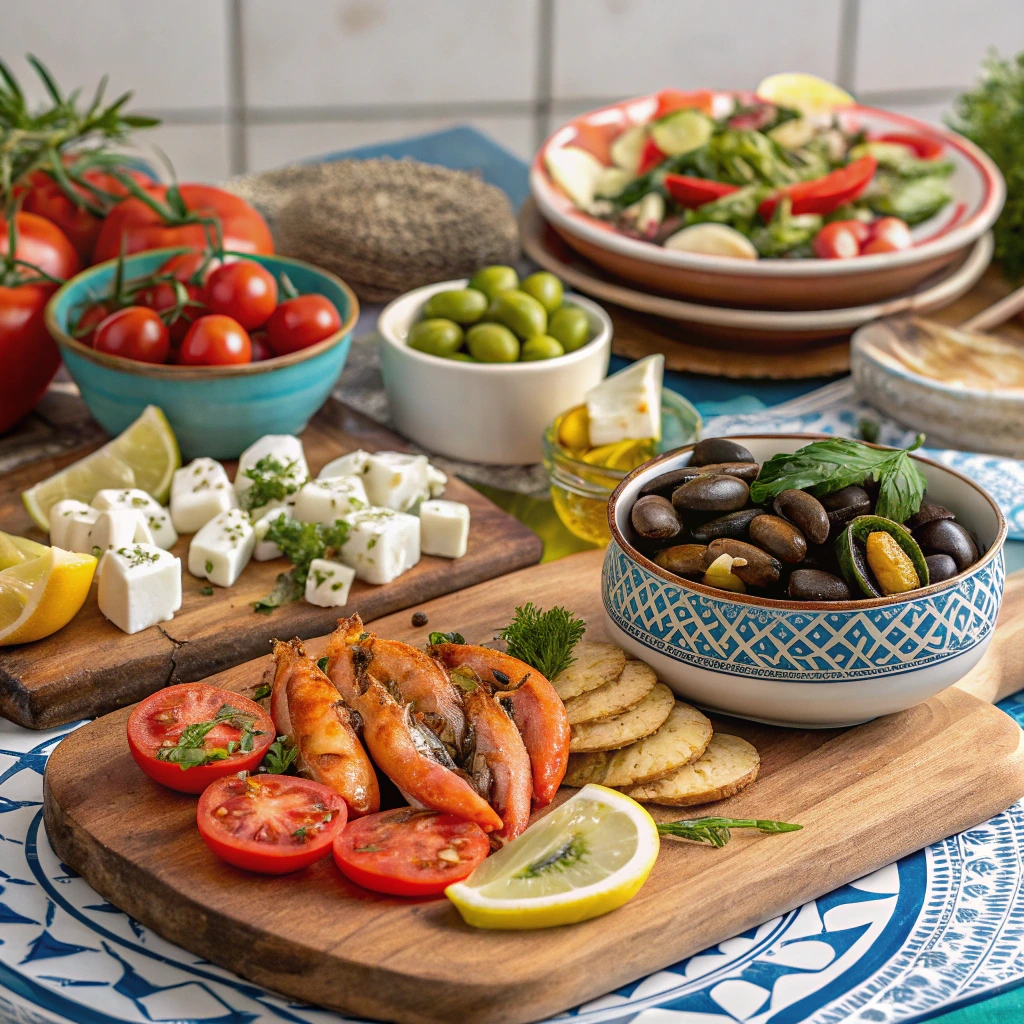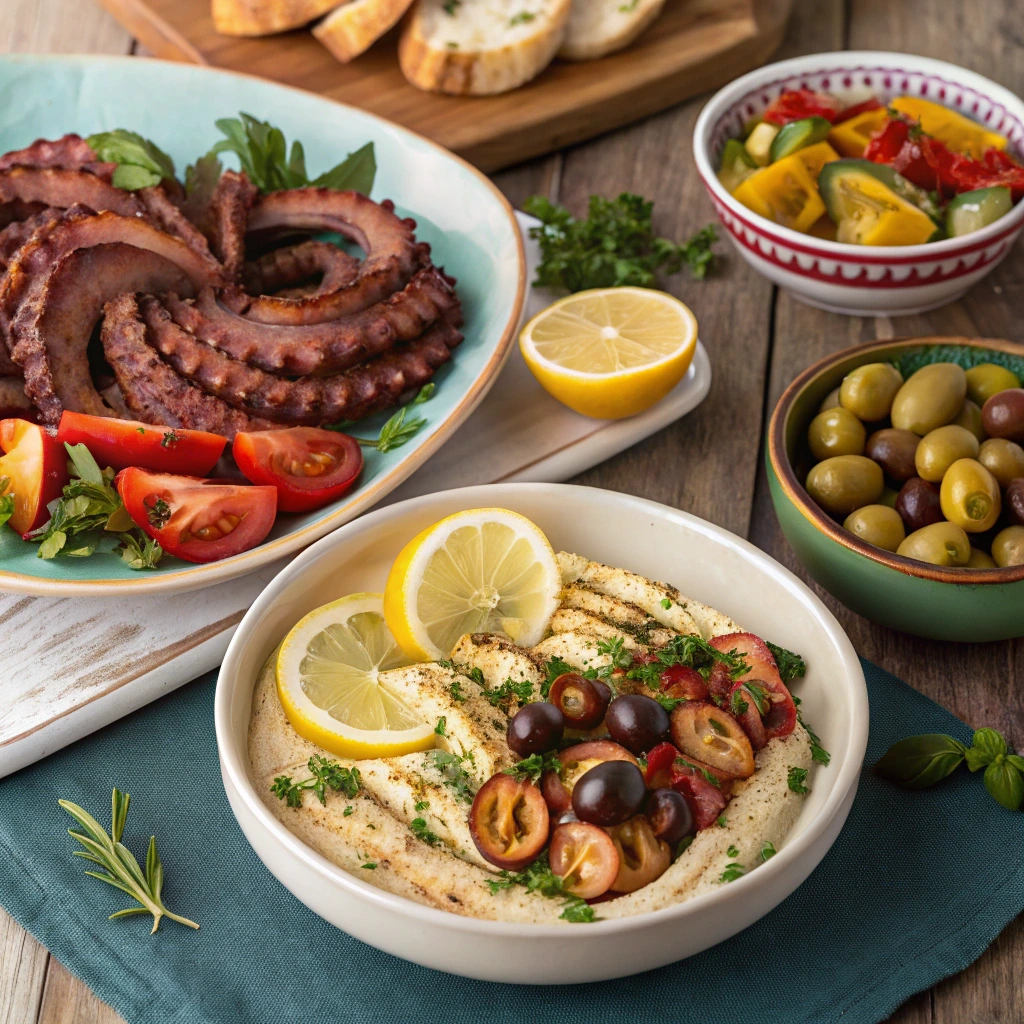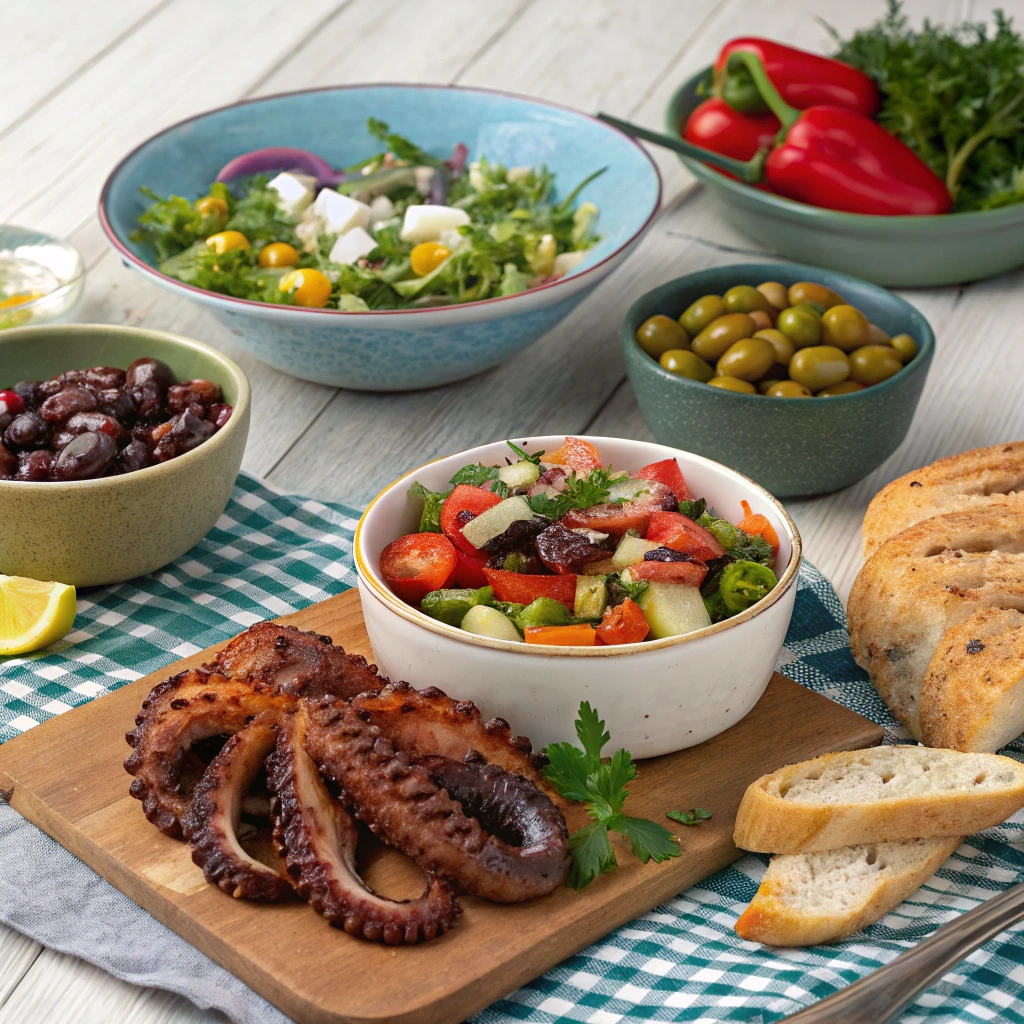
Introduction: A Personal Journey with Mediterranean Food
Imagine stepping into a bustling market in the heart of Greece, where the air is filled with the scent of fresh olives and ripe tomatoes. Picture yourself savoring a simple yet flavorful Greek salad, or enjoying a hearty bowl of hummus with warm pita bread. For many, this isn’t just a dream—it’s a reality that has transformed lives through the power of Mediterranean food.
Mediterranean cuisine isn’t just about delicious meals; it’s a way of life that promotes health, happiness, and longevity. Whether you’re a seasoned cook or a beginner looking to explore new flavors, this guide will take you on a journey through the rich tapestry of Mediterranean food, offering healthy and delicious recipes along the way.
Introduction to Mediterranean Cuisine
What is Mediterranean Food?
Mediterranean food encompasses the culinary traditions of countries bordering the Mediterranean Sea—think Greece, Italy, Spain, Turkey, and more. These regions share a common thread: an emphasis on fresh, wholesome ingredients like olive oil, vegetables, seafood, and whole grains. This diet is not only mouth-wateringly delicious but also incredibly nutritious.
- Key Ingredients: Olive oil, fresh vegetables, seafood, legumes, whole grains.
- Flavors: Light, fresh, and balanced, with a focus on natural ingredients.
Why is Mediterranean Food So Popular?
The popularity of Mediterranean cuisine is no coincidence. Studies have shown that people following this diet tend to live longer, healthier lives. It’s rich in heart-healthy fats from olive oil, packed with antioxidants from fresh vegetables, and loaded with protein from seafood and legumes.
- Health Benefits: Lower risk of heart disease, improved weight management, enhanced longevity.
- Cultural Appeal: Simple, flavorful dishes that are easy to prepare at home.
A Quick Overview of Mediterranean Ingredients
At the core of Mediterranean cuisine are its staple ingredients, each contributing unique flavors and health benefits. Let’s take a closer look:
- Olive Oil: A cornerstone of the Mediterranean diet, providing monounsaturated fats that support heart health.
- Feta Cheese: Adds a tangy flavor to salads and other dishes.
- Chickpeas: A versatile ingredient used in everything from hummus to stews.
- Fresh Vegetables: Abundant in every meal, from leafy greens to colorful bell peppers.

Top Healthy Mediterranean Food Staples You Need to Know
Olive Oil: The Heart-Healthy Fat
Olive oil is more than just a cooking ingredient; it’s a symbol of the Mediterranean lifestyle. Rich in monounsaturated fats, olive oil can help lower bad cholesterol levels while maintaining good cholesterol.
- Health Benefits: Reduces inflammation, supports heart health, enhances nutrient absorption.
- Usage Tips: Drizzle over salads, use for sautéing, or as a finishing touch on cooked dishes.
Fresh Vegetables: The Foundation of Every Meal
Vegetables play a starring role in Mediterranean cuisine. From juicy tomatoes to crisp cucumbers, these ingredients form the backbone of countless dishes.
- Nutritional Value: Low in calories, high in fiber, vitamins, and minerals.
- Popular Uses: Salads, side dishes, soups, and main courses.
Seafood: A Rich Source of Omega-3 Fatty Acids
Seafood is another hallmark of Mediterranean cuisine, especially fish like salmon, sardines, and mackerel. These fatty fish are rich in omega-3 fatty acids, which are crucial for brain and heart health.
- Health Benefits: Supports cognitive function, reduces inflammation, improves cardiovascular health.
- Cooking Tips: Grilling, baking, or poaching to preserve nutrients.
Whole Grains and Legumes: Nutrient-Packed Carbohydrates
Whole grains and legumes provide sustained energy and essential nutrients. Foods like quinoa, bulgur, farro, chickpeas, and lentils are staples in Mediterranean diets.
- Health Benefits: High in fiber, protein, and complex carbohydrates.
- Popular Dishes: Stews, salads, and side dishes.
Easy Mediterranean Recipes for Beginners
Greek Salad: A Fresh and Simple Starter
Greek salad is one of the simplest yet most satisfying Mediterranean dishes. Here’s how to make it:
| Ingredients | Quantity |
|---|---|
| Ripe tomatoes | 4 medium |
| Cucumber | 1 large |
| Red onion | 1 small |
| Kalamata olives | ½ cup |
| Feta cheese | ½ cup |
| Extra virgin olive oil | 3 tbsp |
| Lemon juice | 1 tbsp |
| Salt and pepper | To taste |
- Preparation Steps:
- Chop tomatoes, cucumber, and red onion.
- Combine in a bowl with olives and feta cheese.
- Drizzle with olive oil and lemon juice.
- Season with salt and pepper.
Hummus and Pita Bread: A Perfect Snack or Appetizer
Hummus is a creamy dip made from chickpeas, tahini, lemon juice, and garlic. Pair it with warm pita bread for a delightful snack.
- Recipe Ingredients:
- Chickpeas (canned or soaked): 1 cup
- Tahini: 2 tbsp
- Lemon juice: 2 tbsp
- Garlic: 1 clove
- Olive oil: 1 tbsp
- How to Make Hummus:
- Blend chickpeas, tahini, lemon juice, and garlic until smooth.
- Drizzle with olive oil before serving.
Grilled Chicken with Lemon and Herbs: A Flavorful Main Dish
Grilled chicken marinated in olive oil, lemon, and herbs like oregano and thyme is a classic Mediterranean dish.
- Marinade Ingredients:
- Olive oil: 3 tbsp
- Lemon juice: 2 tbsp
- Oregano: 1 tsp
- Thyme: 1 tsp
- Garlic: 2 cloves
- Cooking Instructions:
- Marinate chicken breasts for at least 30 minutes.
- Grill until thoroughly cooked.
Tzatziki Sauce: A Cool and Creamy Condiment
Tzatziki sauce is a refreshing dip made from Greek yogurt, cucumber, and garlic.
- Ingredients:
- Greek yogurt: 1 cup
- Cucumber: 1 small
- Garlic: 1 clove
- Lemon juice: 1 tbsp
- Dill: 1 tsp
- How to Prepare:
- Shred cucumber and squeeze out excess water.
- Mix with yogurt, garlic, lemon juice, and dill.
Health Benefits of the Mediterranean Diet
Heart Health and Lower Risk of Cardiovascular Disease
The Mediterranean diet is renowned for its heart-healthy benefits. Research shows that regular consumption of olive oil and omega-3-rich seafood can significantly reduce the risk of cardiovascular diseases.
- Supporting Data: Studies indicate a 25% reduction in heart disease risk among those who follow this diet.
- Practical Tip: Incorporate olive oil into your daily cooking routine.
Weight Management and Sustained Energy
With its emphasis on whole foods and lean proteins, the Mediterranean diet supports weight management and provides sustained energy throughout the day.
- Supporting Data: Diets rich in whole grains and vegetables help maintain stable blood sugar levels.
- Practical Tip: Plan meals around whole grains and lean proteins.
Anti-Inflammatory Properties and Longevity
Anti-inflammatory foods like olive oil, leafy greens, and berries are abundant in Mediterranean cuisine, contributing to reduced inflammation and increased longevity.
- Supporting Data: People following this diet tend to live longer, healthier lives.
- Practical Tip: Include anti-inflammatory foods in your daily meals.
Diabetes-Friendly and Low in Processed Foods
The Mediterranean diet is naturally low in processed foods and refined sugars, making it ideal for managing diabetes.
- Supporting Data: Diets rich in whole grains and vegetables help regulate blood sugar levels.
- Practical Tip: Replace processed snacks with fruits and nuts.

Tips for Incorporating Mediterranean Food into Your Daily Life
Start Small: Swap Out Unhealthy Ingredients
Begin by making small changes, such as swapping butter for olive oil or white bread for whole-grain options. These minor adjustments can lead to significant health improvements over time.
- Practical Tips: Use olive oil for cooking and drizzling, choose whole-grain bread for sandwiches.
Meal Prep: Plan Your Mediterranean Meals Ahead
Meal prepping can simplify your transition to Mediterranean eating. Prepare large batches of quinoa, roasted vegetables, or soups that can be used in multiple meals throughout the week.
- Practical Tips: Invest in quality containers and plan meals ahead using a weekly schedule.
Experiment with New Flavors: Try Regional Dishes
Exploring regional dishes within the Mediterranean diet can keep meals exciting. Try Greek moussaka, Spanish paella, or Lebanese falafel to experience diverse flavors.
- Practical Tips: Look up authentic recipes and experiment with new spices and techniques.
Stock Your Pantry with Mediterranean Essentials
Having essential ingredients on hand makes it easier to cook Mediterranean-style meals. Stock up on items like olive oil, canned chickpeas, tahini, and spices like cumin and paprika.
- Practical Tips: Create a shopping list and buy in bulk to save money.

Conclusion: Embrace the Mediterranean Way of Eating
Recap the Benefits of Mediterranean Food
Mediterranean food offers numerous health benefits, including improved heart health, better weight management, and increased longevity. Its emphasis on fresh, wholesome ingredients makes it both delicious and nutritious.
Encourage Readers to Start Today
Even small changes can lead to big improvements in health and well-being. Start incorporating Mediterranean foods into your daily life today and experience the transformative power of this incredible cuisine.
Frequently Asked Questions (FAQ)
Q1: What are the key ingredients in Mediterranean food? A1: Mediterranean food relies heavily on ingredients like olive oil, fresh vegetables, seafood, legumes, and whole grains. These ingredients contribute to the diet’s health benefits and delicious flavors.
Q2: Is Mediterranean food good for weight loss? A2: Yes, the Mediterranean diet is excellent for weight loss due to its emphasis on whole foods, lean proteins, and healthy fats. It helps maintain stable blood sugar levels and provides sustained energy.
Q3: How can I start incorporating Mediterranean food into my daily life? A3: Begin by making small changes, such as swapping unhealthy ingredients for healthier alternatives like olive oil. Plan your meals ahead and stock your pantry with essential Mediterranean ingredients.
Q4: Are there any specific Mediterranean recipes for beginners? A4: Absolutely! Start with simple recipes like Greek salad, hummus, grilled chicken, and tzatziki sauce. These dishes are easy to prepare and showcase the flavors of Mediterranean cuisine.
